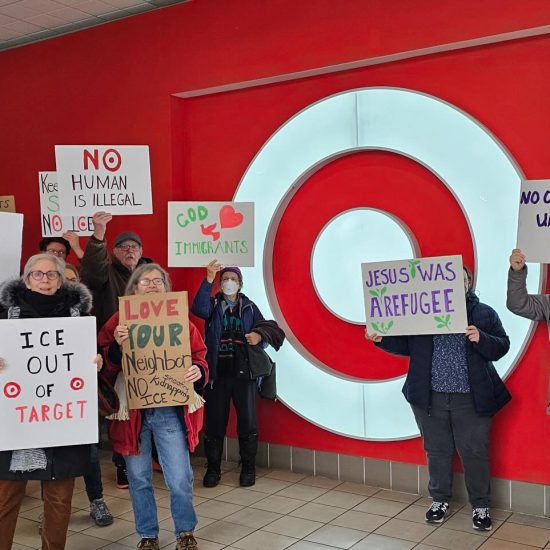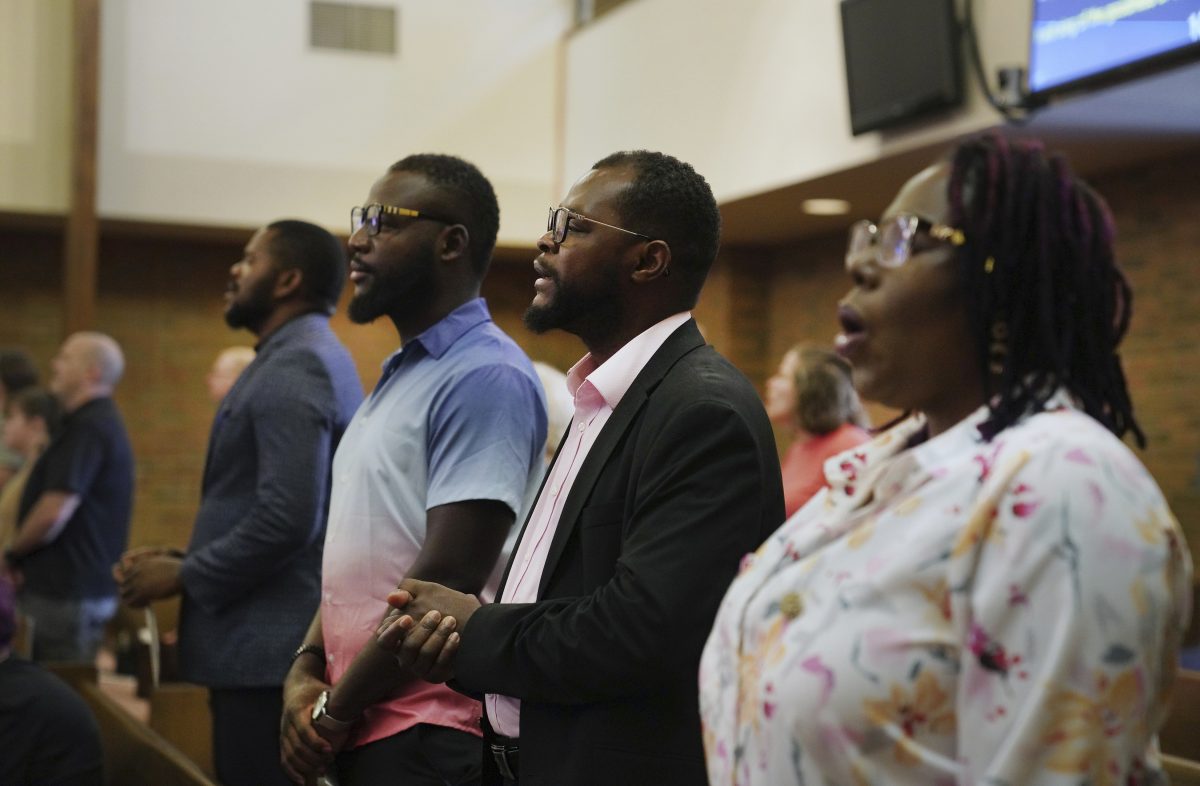
“If I have to create stories so that the American media actually pays attention to the suffering of the American people, then that’s what I’m going to do.”
J.D. Vance, the Republican candidate for vice president and a U.S. senator from Ohio, offered that statement Sunday (Sept. 15) on CNN. He made the remark while defending his role in spreading baseless rumors alleging Haitian immigrants in Springfield, Ohio, were stealing and eating pets. After being pushed by CNN’s Dana Bash for admitting he was creating stories, Vance tried to walk back his comment by suggesting he was just trying to create a media focus but that his claims came “from firsthand accounts from my constituents.”
The alleged “firsthand accounts,” however, had already been debunked. The woman whose Facebook post started the online rumors has recanted. She had claimed she was told a story from her neighbor who heard it from her daughter who heard it from a friend. That made the Facebook post a fourth-hand account that somehow went viral despite the lack of credible sourcing. But her neighbor said the post was inaccurate, adding, “I don’t have any proof” of the incident. The woman who wrote it on Facebook expressed remorse for sharing the rumor online and voiced her concern for the Haitian community impacted by the political attention to the rumor.
Additional “evidence” online to justify the claims had also already been debunked. Police bodycam video posted online to defend the allegations turned out to be from an arrest of a non-Haitian woman in a different city on the other side of the state (and she’s pleaded not guilty by reason of insanity). And a photo of a Black man carrying two dead geese was also from a different part of Ohio.
All of that was known by Sunday, but Vance continued to push the story. Even after the claims have been debunked by police, local officials, media investigators, and Ohio’s Republican Gov. Mike DeWine, Vance keeps attacking Haitian immigrants in a quest to scare voters into backing his ticket to “save America” from Black immigrants. Vance did so in the name of protecting “my constituents” even though the Haitian immigrants living in Ohio are also his constituents.
The situation especially escalated after former President Donald Trump repeated the false claims during his debate with Vice President Kamala Harris. Trump, who previously called Haiti a “sh*thole” nation, was upset by Harris mocking his rallies. So he declared, “In Springfield, they’re eating the dogs! The people that came in, they’re eating the cats. They’re eating the pets of the people that live there.” That’s when things got worse for the residents in Springfield.
Two days after the presidential debate, a bomb threat that included hateful remarks about Haitians shut down City Hall, several other government buildings, and an elementary school. The next day, more bomb threats forced the closing of multiple schools and government buildings. Then over the weekend, more bomb threats led to lockdowns of multiple buildings, including a hospital and a medical center. Clark State College switched to virtual classes for this entire week after emailed threats. And Wittenberg University, a local school affiliated with the Evangelical Lutheran Church in America, canceled campus events and moved to virtual classes after a threat targeting Haitian students. An annual culture festival scheduled for yesterday was canceled due to security concerns.
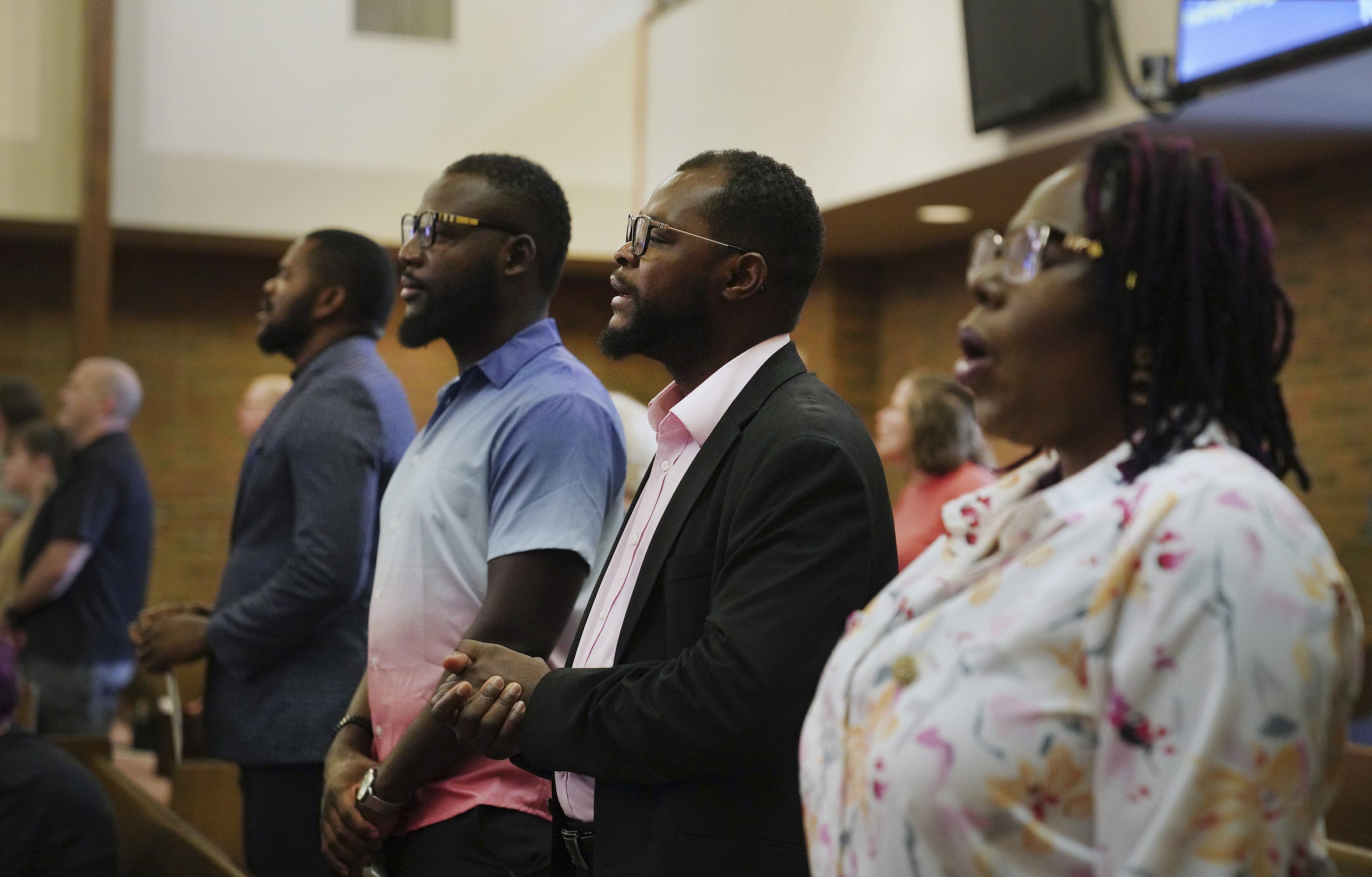
Members of the Haitian community in Springfield, Ohio, stand for Sunday worship at Central Christian Church, on Sept. 15, 2024. (AP Photo/Jessie Wardarski/Associated Press)
Rather than admitting the information was false and apologizing, Vance, Trump, and numerous conservative commentators keep pushing the racist attacks on Haitian immigrants. Some have gone beyond the original claim about eating pets to make other racist claims, like Donald Trump Jr. insisting Haitians are inherently less intelligent — basically the same argument enslavers employed to justify their mistreatment of Black people. The Proud Boys, a White Supremacist group that participated in the Jan. 6 insurrection, marched in Springfield over the weekend. Local Haitian Americans have shared stories of bullying and threats.
After spending a week pushing false attacks on Haitians in his own state, Vance yesterday told a White evangelical group in Georgia that he wants “our public policy to be motivated by the wisdom of loving thy neighbor.” But loving one’s neighbor means you can’t spread racist lies about them!
While some politicians and pundits turn life in an Ohio city into a bit of hell, local Christians are working to minister to those targeted by the racist rumors. We are seeing both the best and worst of our society right now, a contrast that should provide clarity on what’s needed. So this issue of A Public Witness treks to Ohio to consider how Christians have been supporting Haitian immigrants before and since the vile politics of the past week.
Welcome to Springfield
Despite the rhetoric claiming Haitian immigrants invaded a small Ohio city, the local businesses and officials actually worked to bring the people there legally in the first place. For a city that had lost a quarter of its population since the 1960s, the influx of immigrants meant more people to work in packaging and machining factories necessary for the community’s economic vitality.
“We needed a workforce,” explained Amy Donahoe, director of workforce development with the Greater Springfield Partnership. “They are coming in and they are working hard and they want to make money.”
Jamie McGregor, who owns the McGregor Metals factory in Springfield, similarly told PBS, “We want more jobs in our community, and in order to fill those jobs, some jobs need to be people who are not originally from here.” McGregor added that his company has just over 30 Haitian employees, which is about 10% of his workforce. What he sees firsthand is quite different from the racist stereotypes pushed by national politicians and commentators.
“I wish I had 30 more. Our Haitian associates come to work every day. They don’t have a drug problem. They’ll stay at their machine. They’ll achieve their numbers. They are here to work. And so in general, that’s a stark difference from what we’re used to in our community.”
The arrival of close to 15,000 Haitian immigrants to Springfield has revitalized the city. The sudden influx also brought growing pains, like an increase in rent prices as the new arrivals outpaced affordable housing in the community that already had a housing problem before the arrival of Haitian immigrants. The growth of the Haitian population did correlate with a rise in vehicle accidents, but there’s not been a rise in violent or property crime.
Many Haitians moved to the U.S. over the last decade amid various natural disasters and political crises in their nation. And Catholics, evangelicals, and mainline Protestants often led the way in welcoming them and advocating for their ability to come to the United States to live, work, and worship.
“We got together immigration lawyers and interpreters to figure out how to help them work,” explained Casey Rollins, executive director of the Springfield chapter of the Society of Saint Vincent de Paul (a Catholic organization dedicated to helping people who are poor). “We are getting them online and getting them to apply [for work permits]. We wanted workers here; they want to work.”
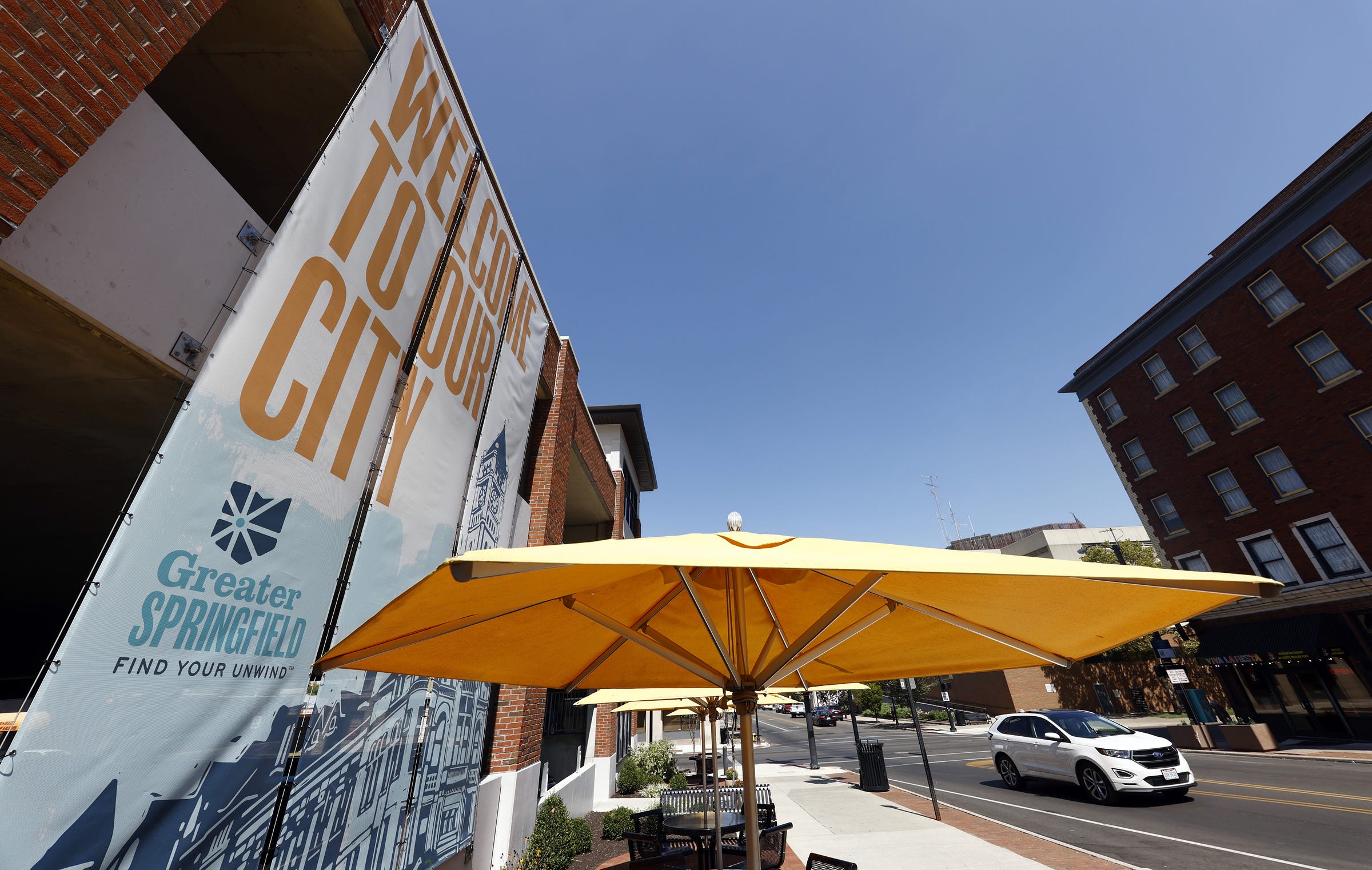
A car drives past a “Welcome to Our City” sign in Springfield, Ohio, on Sept. 11, 2024. (Paul Vernon/Associated Press)
Since 2011, Haitians have been granted the right to live and work in the U.S. through the Temporary Protected Status program of the Department of Homeland Security. TPS designation notes that because of environmental or political circumstances where it’s unsafe for people to live, nationals from those nations may stay in the U.S. unless they have a criminal record that makes them ineligible for TPS protections. For Haitians, the TPS status started after the devastating 2010 earthquake, with the political crisis since 2021 also impacting the decisions by government officials to renew the status.
As is true in most TPS cases, Christian groups that minister to refugees and immigrants have been among the loudest voices urging TPS status for Haitians. Those advocating for this status have included the American Friends Service Committee, Church World Service, Disciples Refugee & Immigration Ministries, Jesuit Refugee Service USA, Mennonite Central Committee, Plant With Purpose, and World Relief. In addition to advocating for TPS extensions, Christian groups have also criticized both the Trump and Biden administrations for mass deportations of Haitians. The most recent TPS extension for Haitians occurred in June, protecting their ability to stay in the U.S. until February 2026.
“It is no exaggeration to state that this TPS redesignation will save lives,” said Danilo Zak, director of policy at Church World Service (a coalition organization that brings together mainline Protestant, Black, and Orthodox denominations). “Haitians are currently experiencing devastating conflict and the United States must heed international calls to offer sanctuary and protections throughout this humanitarian crisis. CWS is proud to stand alongside our Haitian community members.”
After thousands of Haitian immigrants settled in Springfield, local Christian ministries and congregations provided resources to help their new neighbors and to worship with them.
Get cutting-edge analysis and commentary like this in your inbox every week by subscribing today!
Loving Neighbors
During worship on Sunday — the fourth day of bomb threats in the community — the congregation of Central Christian Church rose to applaud and welcome the five Haitian community leaders who were visiting. Rev. Carl Ruby and others hugged their Haitian neighbors.
“Jesus said that he is the way, the truth, and the life. Jesus is with us in truth. And the truth is that Haitians are not eating pets in Springfield,” Ruby declared. “We love you. … We are glad you’re here.”
Ruby encouraged congregants to help hand out thousands of cards to show support for the Haitians in their community. The cards read in both Creole and English: “I’m glad you are here. Christ loves you and so do I.”
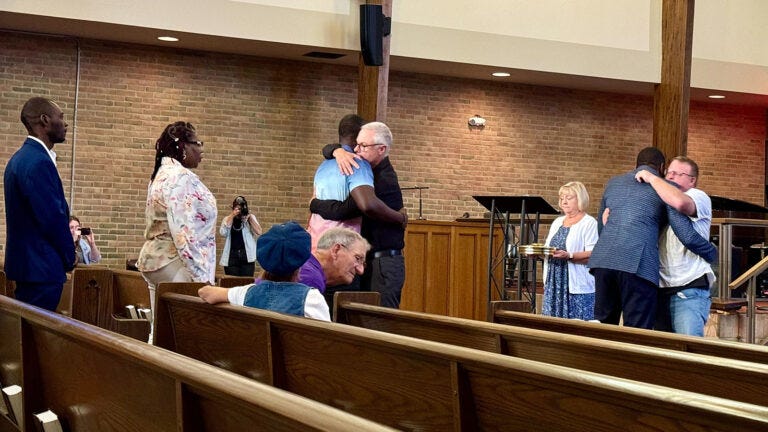
Rev. Carl Ruby (center) and other leaders hug members of the Haitian community during a worship service at Central Christian Church in Springfield, Ohio, on Sept. 15, 2024. (Kathryn Post/Religion News Service)
Numerous churches in town have engaged in outreach to Haitians moving there. Rev. Wes Badia, the retired former pastor of First Baptist Church (an American Baptist congregation), told PBS that Haitians moving to town meant “new people” joining a church that had been declining along with the city’s population. During the worship service on Sunday, people talked about how they are a loving community and will continue to follow Jesus in loving and welcoming all their neighbors. Rev. Adam Banks, the current pastor at First Baptist, said his city is blessed with a “Samaritan situation” by being given a chance to serve their neighbors and “celebrate beloved community.”
Rev. Vicki Downing, pastor at Grace United Methodist Church (that’s had a Haitian immigrant outreach ministry since 2021), also criticized the “made up stories” by “people who are full of hate and want to sow division and encourage prejudice.” Noting that the church has Haitian immigrants who have been part of the church for more than three years, Downing added, “We are blessed to have these hard-working and God-fearing people as part of our church family. May God help us to follow Jesus’s example of offering love and help to all people, who cross our path.”
Kathryn Post of Religion News Service reported that the weekly English Speakers of Other Language course held at First Evangelical Haitian Church normally struggles to find enough English-speaking conversation partners, but this Sunday they had about 30 volunteers to help. At the end of the session, the English speakers, many from local churches, gave flowers and baked good to the Haitian English learners.
But local religious leaders aren’t just serving their Haitian neighbors. They’re also calling out the politicians making false claims. Ruby declared at church Sunday, “We respectfully call on all politicians and media figures who are promoting this rumor to help make Springfield great and safe again by speaking the truth about our community.”
Similarly, Viles Dorsainvil, a former pastor in Haiti and the leader of Haitian Community Help and Support Center in Springfield, emphasized that “words matter.” He explained, “What you say can unite people, or it can create great division in a community. This is what we are experiencing now.” He also said about Trump and Vance: “If they have the heart of God, they will think differently and speak differently.”
Such public rebukes of false attacks are important. It’s inspiring to see churches welcoming, serving, and defending their Haitian neighbors. It’s not enough to just feed them, teach them English, help them get jobs, and bring them into worship. Part of what it means to love our neighbors is to defend them against White Supremacists marching in town and hateful politicians spreading racist and fictitious attacks. Loving our neighbors means not crossing by to support politicians who lie about them, inspire bomb threats against them, and demonize them.
As a public witness,
Brian Kaylor



